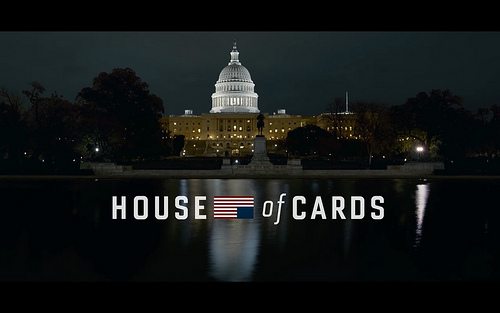Netflix Comes Up Trumps
Is this the beginning of the end for broad-cast television? Grandiose statements aside and context forefront, in House of Cards, on-demand Internet media streaming service Netflix has produced a monolith of a show, a significant stepping stone to resting among the great networks producing high-quality television like BBC, HBO and AMC. Not only is it one of the very few shows to be released exclusively on the Internet but also the most popular TV show in the world according to IMDb. Not bad, for the company you thought was simply ‘the one that ain’t LoveFilm’.
Adapted from the BBC mini-series of the same name that aired in 1990 (this time -swapping the tenure end of Margaret Thatcher with the modern age of the smartphone) House of Cards follows Francis Underwood, a powerful Democratic US Congressman who is snubbed the position of Secretary of State following the election of a new president. Accompanied by his equally formidable wife Claire, he responds by constructing a slow, methodical and amoral scheme, manipulating every politician, lobbyist, reporter and common citizen as pawns in his political war against those who broke their promises. Kevin Spacey, the face and primary driving force behind the series inhabits the role of Francis beautifully. His South Carolinian accent may initially give you a chuckle but Spacey dishes out brutality and elegance in equal measure with great proficiency and flair. Robin Wright, who plays Francis’ strong-willed wife, confidante, and head of possibly the most unscrupulous charity since Kony 2012, excels particularly in her onscreen rat-a-tat exchanges with Spacey. Similar things can be said about the young Kate Mara who plays the sly and quick-witted reporter Zoe Barnes struggling to climb the journalistic ladder while juggling office politics.
The show bolsters equally prestigious talent behind the camera in the form of David Fincher (Seven, Fight Club and The Social Network), arguably the greatest filmmaker of his generation. Fincher’s distinct colour palette paired with an orchestral score creates a more unique cinematic tone for the show and his fondness for intellectually literate scripts like House of Cards really shows. It’s clear the series borrows heavily from Shakespeare. Claire in particular evokes a more nuanced and less erratic Lady Macbeth while Francis’s tendency to break the fourth wall feels strongly influenced by Richard III. You won’t be able to help but squeal with joy when Spacey gives the odd smirk or eye roll to the audience. Although it might be refreshing to know what the character is thinking at all times, a lot more subtext could go a long way in building atmosphere rather than a simple spelling out of plot points. However, a lot of the show’s strength comes from its compel- ling characters in particular its convincing portrayal of women in power without forget- ting the undercurrent of sexism still apparent in political and journalistic culture. All in all it’s a familiar tale of one man’s revenge in an unfamiliar setting (Capitol Hill) executed with real panache.
Perhaps what is even more fascinating than the show itself, is its distribution system. Netflix’s decision to release all 13 episodes of House of Cards online at one time rather than the usual weekly broadcast was a bold move, one that left the audience and potential viewers divided. The truly great benefit of this method is its ability to provide 40 countries with a new TV series simultaneously. Hopefully, gone are the days where we have to wait impatiently for our favourite American or Scandinavian imports to cross the ocean and grace our screens (though, you and I both know there are ways around that). This is a potentially huge step in the battle against piracy, especially since the price of the subscription is relatively small given the extent of their collection of films, sitcoms, reality shows and even anime. Essentially by cutting out the middlemen and the advertisers, Netflix has provided a platform for which original content can be produced to satisfy the needs of both the marathon viewer and the casual viewer. I can already hear the screams of approval from Art students with Mondays and Wednesdays off emanating from Rootes.
The dawn of this type of internet television isn’t without its flaws. Linear television provides the audience with an indirect sense of community whether you’re watching it with friends, or live tweeting it with a bunch of strangers. Perhaps internet television draws more parallels to reading a book. Although you watch at your own pace, it’s a given fact that the sequels take much longer to come out (ahem, George R.R. Martin…), so don’t expect season two of House of Cards to be hitting your screens anytime soon. Most of all however, it’s the longer lasting sense of euphoric anticipation while waiting a week after a jaw-dropping cliff-hanger that I enjoy about linear television.
‘This is the beginning of the end for broad- cast television’ say the pro-marathoners. ‘You might very well think that; I couldn’t possibly comment’ riposte the traditionalists.
What is most likely going to happen however is that both Internet and linear television will continue to co-exist together, because effectively they are two sides of the same coin. As long as live or ‘event’ television exists, so will traditional TV broadcasting. So perhaps it’s still too early to throw the Freeview antennae in the bin just yet. Even if House of Cards seems like a $100 million investment by Netflix to keep subscribers from leaving, one cannot deny that without needing to persuade every demo- graphic to watch new shows, there is significant promise for programmes with a specific niche being developed. Hell, one of the most esoteric but funniest American television sitcoms in the last decade, Arrested Development, returns with 14 new episodes concurrently released in May on Netflix. I wouldn’t be surprised if the economy stagnates that day.

Comments (1)